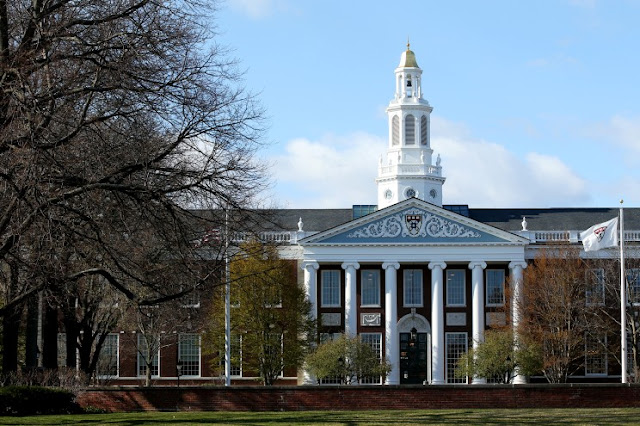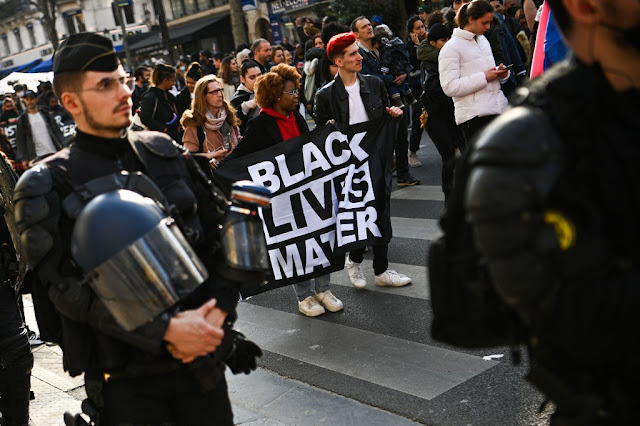By Glenn H. Reynolds | New York Post
College
campuses are seeing resistance to the "woke." Shutterstock Photo
People used to talk about “resistance” to President Donald Trump. That’s old hat. Now it’s resistance to the woke.
And we’re seeing more and more of that resistance.
University of Michigan economics professor Mark J. Perry is working with
numerous folks across the nation to file equal-opportunity complaints with the
federal Department of Education when colleges and universities discriminate on
the basis of race and sex.
Perry recounts that in three years of research, he’s found more than 1,200
Title IX and Title VI violations — and continues to uncover more. “The
significant and troubling frequency of violations of federal civil rights laws
in higher education demonstrates unaddressed systemic sexism and racism that
needs greater awareness, exposure and legal challenges,” he writes.
“Typical and frequent” Title IX violations “that have gone unchallenged for
many decades,” he says, include “female-only scholarships, fellowships, awards,
study spaces, mentoring, tutoring, special freshman orientations, industry
meetings, summer STEM programs, summer STEM camps, coding clubs, leadership
programs, entrepreneurship programs, gym hours, etc. that operate exclusively
for women while illegally excluding and discriminating against boys and men.”
Perry says that “racially segregated or racially preferential” programs and
events that violate Title VI have also “become increasingly common in higher
education.”
So far, he reports, the federal government has opened 218 investigations
against offending schools, and 133 have been resolved in his favor. More are on
the way. And even the schools that escape punishment may think twice before
doing this sort of thing again.
Perry, by the way, invites people to contact him if they’d like help filing
their own complaints.
Professors are suing, too. With help from the Foundation for Individual Rights
in Education, Michael Phillips, a historian at Texas’ Collin College, is suing
his employer for trying to discipline him over Facebook posts critical of
university policy. He’s the third Collin College professor to sue over what he
calls an “atmosphere of terror.”
The proper response to an atmosphere of terror is, of course, to stand up to
it. And he is.
And the American Civil Rights Project forced Coca-Cola’s general counsel’s
office to stop an openly discriminatory and illegal program of racial quotas.
Coke had said it would only hire outside law firms that met its standards for
racial makeup. Law firms doing business with Coke were supposed to present
quarterly reports on the racial background of the attorneys doing Coke’s legal
work — and risk losing the account if the numbers didn’t reach the quotas.
This was clearly illegal race discrimination barred by 42 US Code Section 1981
as well as other anti-discrimination laws. As the ACR Project’s Dan Morenoff
put it, “It’s amazing that neither the general counsel of a large corporation
like Coke, nor the large, prominent law firms the policy involved, seem to have
considered its direct conflict with American civil rights laws. It’s even more
amazing that so many other sophisticated American corporations have similarly
disregarded obvious legal problems to adopt comparably ‘woke’ policies.”
After pressure from ACR, Coke backed down and ended the program (after claiming
the loudly proclaimed policy was never really policy at all). Now ACR is
writing other major corporations with similar policies — Starbucks, McDonald’s
and Novartis AB — demanding that they stop the illegal discrimination too. The
group is also in negotiations with Lowe’s Companies about illegal racial
preferences in promotion.
Meanwhile, Nathaniel Hiers, who was fired over his criticisms of the University
of North Texas’ “microaggressions” policy, is suing and won an important
victory when a US District Court held that university officials could be made
personally liable for the firing. They should have known that firing a
professor for his speech on issues of public concern was a First Amendment
violation and thus won’t be allowed to claim “good faith” immunity. A few
months ago, the US Court of Appeals for the 8th Circuit found University of
Iowa officials personally liable for discriminating against a student religious
group on similar grounds.
More lawsuits and administrative complaints are likely on the way, with similar
outcomes: There’s a lot of low-hanging fruit there. Most corporate and academic
officials seem to think the law doesn’t apply so long as they’re politically
correct. Time for them to learn otherwise.
_________________
Glenn Harlan Reynolds is a professor of
law at the University of Tennessee and founder of the InstaPundit.com blog.
https://nypost.com/2022/03/24/resistance-is-rising-to-woke-colleges-race-and-sex-discrimination/
_________________
RELATED
ARTICLE
Harvard cancels a black academic who debunked
woke orthodoxy
By Peter
W. Wood | New York Post
Harvard University, just like its Ivy League
counterparts, have attempted to silence professors who question critical race
theory. Maddie Meyer/Getty Images
Roland G. Fryer is a tenured
professor of economics at Harvard — an anointed member of the elite by most
definitions. He is also black, widely published and the recipient of numerous
awards, including a MacArthur “genius” grant for his work on the black
“achievement gap” in grade school. Fryer was a student of Nobel
laureate Gary Becker and a close associate of other economists who focus on
rigorous analysis of empirical data.
That’s led him to observations
that were a bit unsettling to higher-education
orthodoxies. For example, Fryer found that the academic achievement
gap accelerates between kindergarten and eighth grade. He also found that,
controlling for a few variables, the initial disparity disappeared.
“Black kindergartners and white
kindergartners with similar socioeconomic backgrounds” achieved at similar
levels. “Adjusting the data for the effects of socioeconomic status reduces the
estimated racial gaps in test scores by more than 40% in math and more than 66%
in reading.”
The number of books in a
child’s household also made an appreciable difference. “On average, black
students in the sample had 39 children’s books in their home, compared with an
average of 93 books among white students.” Adjusting for that “completely eliminates
the gap in reading” as children progress through first grade. These findings
contradicted the standard view that black children are
already locked into academic last place before they even reach school.
This is good news, in that it
means the problem is not as intractable as it seemed. Or rather, it would have
been good news to anyone who wants the racial disparity to disappear through
interventions that are known to work.
But it was terrible news to
activists who are invested in the idea that
“systemic racism” explains everything. Socioeconomic standing and
household reading, after all, can be improved.
I have borrowed from Fryer’s
2006 article “Falling Behind: New evidence on the black-white achievement gap”
for my summary. Fryer, however, was just warming up to further
provocations against
racial orthodoxy. He also decided to take a look at the data about
police stops and shootings. He confirmed that blacks were more than 50% more
likely than whites “to experience some form of force in interactions
with police,” something that Fryer said was “the most surprising
result of [his] career.”
But when it came to shootings,
he could find “no racial differences in either the raw data or when contextual
factors are taken into account.” This flat-out contradicts the Black
Lives Matter assertion that has been uncritically embraced by the
academy, the press and numerous politicians who hold that police readily resort
to deadly violence in dealing with blacks.
Fryer’s paper on this, “An
Empirical Analysis of Racial Differences in Police Use of Force,” was written
in 2016 and published in final form in 2019 in the Journal of Political
Economy, well before George
Floyd’s death ignited riots and a frenzied affirmation in academe that
police are the agents of brutal, racially motivated oppression.
From this, one might conclude
that Professor Fryer had learned how successfully to kick over the traces of
the liberal academic establishment. He was by no definition a conservative, but
a kind of independent contrarian who was willing to go wherever the evidence
took him. And for a while it appeared to have taken him to the heights of
academic achievement. His work received a lot of criticism in places like The
New York Times, but he also won substantial funding for his Education
Innovation Laboratory at Harvard.
The Black Lives Matter movement has poisoned
academia with the myth that African Americans suffer from “systemic racism.” CHRISTOPHE
ARCHAMBAULT/AFP via Getty Images
Then the bottom fell out.
I have no shortage of
bottom-falling-out stories for academics. They are sometimes caught doing
atrocious things, sometimes punished for speaking up against academic policies
they disagree with and sometimes disciplined because administrators seem
entranced with bizarre ideas. We are in academia, after all, where egos are
fragile and reputational destruction is
the favorite sport. Reputational destruction, of course, comes in two
popular flavors: race and sex. Since Professor Fryer is black, you might expect
the line of attack will involve sex, and you’d be right.
According to The New York
Times, Professor Fryer was accused in 2018 of engaging in “unwelcome conduct of
a sexual nature toward four women who worked in the Harvard-affiliated research
lab he created.”
I have no access to the details
of the allegations, but Harvard did its work and came back with a report that
amounted to a finding that he had flirted with a graduate student years ago,
and that a woman he had fired found some of his language annoying. Naturally,
these claims were stretched to their outer boundaries, but the initial faculty
committee saw nothing of great moment.
In the #MeToo era, rules of
double jeopardy
don’t apply. Harvard decided to put the case before another tribunal —
a secret one, but one that happened to include two black faculty members whose
work had received some shade from Fryer’s academic writings. Sure enough, the
second tribunal decided that Fryer had crossed all sorts of invisible lines.
As a tenured member of the
Harvard faculty, Fryer couldn’t easily be fired, though administrators pushed
to fire him, which would have been a first since the Civil War. But there are
lots of other ways to ruin a faculty member. They suspended Fryer for two
years, during which he was barred from teaching or using university resources.
And they permanently closed his off-campus lab, the Education Innovation
Laboratory.
Harvard University attempted to suppress economics
professor Roland G. Fryer by denying access to academic resources. Adam
Glanzman/Bloomberg via Getty Images
This looks like an academic
death sentence for an obscure violation, yet Fryer may well stage a comeback.
In a new documentary, professional filmmaker Rob Montz has assembled, for the
first time in video form, a compelling 25-minute presentation on what happened
to Fryer at Harvard, complete with scary music.
Fryer didn’t participate in the
documentary, which perhaps allowed Montz to say things that Fryer himself
probably wouldn’t. I’ve never met Fryer, but we have several mutual friends who
alerted me to his story, and I have heard several grapevine versions of what
happened that run in the same direction: a tale of a vindictive former employee
and others sharpening grievances for their own ends and a total denial of due
process in favor of putting the man in the hands of his campus adversaries.
It is more or less what we have
come to expect from higher education. The higher the educational institution,
the more lowdown the tactics. Perhaps I’m all wrong about this, and Fryer is a
serial sexual harasser, and his contrarian writings about race and education
and race and policing had nothing to do with his cancelation. Who can say for
sure?
But I will place my bet on
Fryer as another human offering to the
gods of wokeness. They breathe in the incense of a burning reputation
and smile in satisfaction.
https://nypost.com/2022/03/25/harvard-cancels-a-black-academic-who-debunked-woke-orthodoxy/




